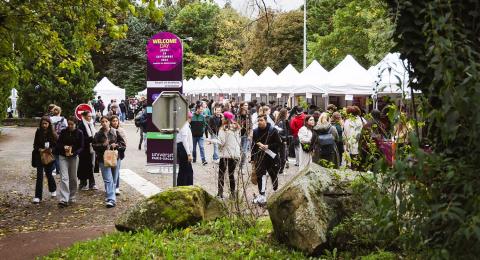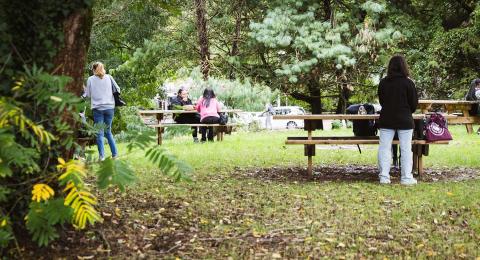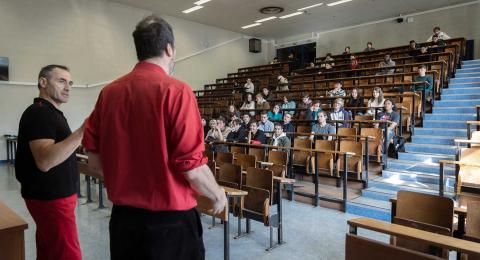The Music and Performing Arts Management (AMSV) course in Musicology is offered by the University of Evry Paris-Saclay. It provides a solid grounding in administration, production, and cultural activities in the fields of music and the performing arts (theater, dance, performance).
The Music and Performing Arts Management (AMSV) program is based on strong partnerships with public institutions (BnF, Scène nationale de l’Essonne, SMAC Le Plan et L’Empreinte, Scène de recherche ENS Paris-Saclay, Théâtre du Châtelet), promoting regional and metropolitan integration. The program is supported by the RASM (Research in Performing Arts and Music) team at the CHCSC (Center for Cultural History of Contemporary Societies) laboratory, covering a wide range of artistic, administrative, and heritage fields. It also offers professional training, preparing students for a variety of careers in administration, production, and cultural activities in the fields of music and performing arts.
Information
Skills
Project management and professionalization skills
- Conceive, design, and implement an artistic or cultural project (concert, event, creation, mediation, exhibition).
- Manage a budget, schedule, and team within the framework of an artistic or mediation project.
- Develop production or financing files (calls for projects, sponsorship, grants).
- Understand the challenges facing the performing arts and cultural sector (legal, economic, institutional).
- Integrate into a professional structure through apprenticeships, internships, or work experience.
Cross-disciplinary and language skills:
- Master one or more modern foreign languages for professional and/or scientific purposes.
- Communicate effectively in writing and orally, adapting your speech to the target audience (specialists, general public, students, cultural partners).
- Work in a team and collaborate in a variety of contexts.
- Use digital tools for office automation, data processing, music editing, and distribution.
- Adapt to a variety of professional environments (teaching, production, mediation, research).
Objectives
The Music and Performing Arts Management (AMSV) program has several complementary objectives, aimed at developing students' expertise in administration, production, and cultural action in the fields of music and the performing arts.
One of the fundamental objectives is to prepare students to develop, structure, and manage artistic projects. The program places significant emphasis on autonomy, organizing collective work, and managing projects in collaboration with performing arts professionals (Scène nationale de l'Essonne, SMAC Le Plan et L'Empreinte, Scène de recherche de l'ENS Paris-Saclay). Real-life scenarios as part of the learning process or obligatory internships during initial training allow students to put these skills into practice in a professional setting, while consolidating their network.
Professionalization is at the heart of the educational project. It relies on the involvement of teachers from the professional world (mediators, producers, cultural administrators, cultural action managers, teacher-researchers, specialized lawyers) and on a network of partnerships with production and distribution structures. The AMSV program is designed to enable each student to develop a coherent and personal project in line with their professional aspirations.
Career Opportunities
Career prospects
Après Master + Doctorat : chercheur ou enseignant-chercheur
Chargé de projet culturel
médiateur culturel
chargé de communication culturelle
chargé de production (culture)
chargé d'événementiel culturel
Métiers de la médiation culturelle
Métiers du journalisme et de la critique musicale
Métiers de l'administration du spectacle vivant
Chargé de programmation de la musique et du spectacle vivant
Chargé d’actions et de médiations culturelles
Responsable de service culturel
Musicien professionnel
Further Study Opportunities
Master 2
Fees and scholarships
The amounts may vary depending on the programme and your personal circumstances.
Admission Route
Capacity
Available Places
Target Audience and Entry Requirements
Students pursuing a bachelor's degree in music or musicology with experience in administration (training, internship, volunteer work, association) or a bachelor's degree in administration, law, cultural management, cultural mediation, or cultural business organization and management.
Supporting documents
Compulsory supporting documents
Motivation letter.
Research project.
All transcripts of the years / semesters validated since the high school diploma at the date of application.
Curriculum Vitae.
Detailed description and hourly volume of courses taken since the beginning of the university program.
Additional supporting documents
Certificate of French (compulsory for non-French speakers).
VAP file (obligatory for all persons requesting a valuation of the assets to enter the diploma).
Supporting documents :
- Residence permit stating the country of residence of the first country
- Or receipt of request stating the country of first asylum
- Or document from the UNHCR granting refugee status
- Or receipt of refugee status request delivered in France
- Or residence permit stating the refugee status delivered in France
- Or document stating subsidiary protection in France or abroad
- Or document stating temporary protection in France or abroad.









